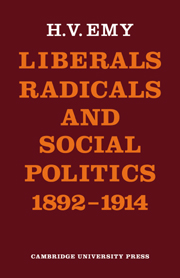Book contents
6 - Taxation, the land, and the budgets of 1909 and 1914
Published online by Cambridge University Press: 04 May 2010
Summary
The high peak of this Liberal government was the budget of 1909, but it would be a mistake to view the budget solely within the context of the post-1906 administration, determined first by the urgent necessity of raising money for social reform, and secondly, by traditional Liberal antipathies towards landowners. The budget certainly reflected such factors, but the form and nature of its provisions were only made possible by previous and significant changes in the Liberal attitude towards the purpose of taxation itself, and further, by the growing preoccupation of a section of Liberal Radicalism with land reform and land taxes as a remedy for unemployment and industrial ills. For a large section of the Liberal party, social organisation did mean land reform. The two debates, over the purpose of taxation and the nature of a land policy, are instructive in providing both an example of the passage of radical ideas into the Liberal party and their expression in policy, and an insight into the real nature of Conservative opposition to the New Liberalism. The two debates, in effect, provide an indication of the continuity of Liberal thinking and the development of Liberal policy throughout the period, indicating that the course of events after 1906 did owe much to the lessons of previous years.
THE DEBATE UPON TAXATION
Orthodoxy, within a financial context, stemmed from the nineteenth-century tradition of peace, retrenchment and reform.
- Type
- Chapter
- Information
- Liberals, Radicals and Social Politics 1892–1914 , pp. 189 - 234Publisher: Cambridge University PressPrint publication year: 1973



